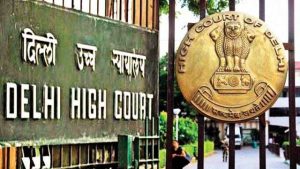Delhi High Court seeks response from JKLF chairman Yasin Malik on NIA plea seeking death penalty for him in terror funding case

The High Court of Delhi issued notice on Monday on a petition moved by the National Investigation Agency (NIA) seeking death penalty for Jammu and Kashmir Liberation Front (JKLF) chairperson and Kashmiri separatist leader Yasin Malik, who was sentenced to life imprisonment last year in a terror funding case.
The Division Bench of Justice Siddharth Mridul and Justice Talwant Singh sought response from Yasin Malik through the concerned Tihar Jail Superintendent and listed the matter for hearing on August 9.
Appearing for NIA, Solicitor General Tushar Mehta argued that propagating one region to be separated from the country made it a ‘rarest of rare case,’ which deserved death sentence.
Noting that in this way, everyone would avoid trial, the SG said any terrorist could come to the country and carry out terrorist activities. The court would say since he has pleaded guilty, he would be awarded life sentence and not capital punishment.
The SG contended that Malik was responsible for the killing four IAF personnel in Rawalpora, Srinagar and was also involved in the kidnapping of Dr. Rubaiya Sayeed, daughter of then Union Minister Mufti Mohammed Sayeed.
The SG pointed out that Yasin, who was trained in Pakistan, had pleaded guilty and remained in jail, to be rescued later. He noted that this was thus, a statutory appeal under the NIA Act, which was applicable in the sentence also.
The law officer recalled that after the kidnapping of Rubaiya Sayeed, four terrorists had to be released, who later masterminded the 26/11 Mumbai terror attacks.
He submitted that charge under Section 121 of the Indian Penal Code (waging war against the Government of India) was made out against Malik, which was punishable with death.
The Apex Court asked the SG about the specific charges against Malik and those to which he pleaded guilty.
The Bench further asked NIA to point out where such acts of killing and kidnapping were mentioned in the order passed by the trial court, which framed charges against Malik.
The top court of the country further asked the agency about the part in the order, which mentioned the charges related to the allegations made in the charge sheet over causing death of public functionaries and abducting the individual to force the government to do something.
In May last year, a special NIA court had sentenced Malik to life imprisonment in a terror funding case. The accused had pleaded guilty in the case.
As per the national agency, if such ‘dreaded’ terrorists were not given capital punishment on account of having pleaded guilty, there will be complete erosion of the sentencing policy and the terrorists would have a way out to avoid capital punishment.
NIA said a life sentence did not commensurate with the crime committed by terrorists in view of the loss suffered by the nation and the families of soldiers.
Talking about the trial court’s conclusion that Malik’s crimes did not fall within the category of the ‘rarest of the rare cases’ for grant of death penalty, the NIA termed this observation as ex facie ‘legally flawed and completely unsustainable’.
NIA reiterated that it has been proved beyond reasonable doubt that Malik spearheaded terrorist activities in the Valley and with the help of dreaded foreign terrorist organisations, had been ‘masterminding, planning, engineering and executing armed rebellion in the Valley in an attempt to usurp the sovereignty and integrity of a part of India’.
It further said that not giving capital punishment to such dreaded terrorist would result in miscarriage of justice, as an act of terrorism was not a crime against the society, but it was a crime against the entire nation.
The agency added that it was an act of ‘external aggression’, ‘an act of war’ and an ‘affront to the sovereignty of the nation’.
The national agency had demanded capital punishment for Malik before the trial court as well.
However, the NIA Special Court had observed that death penalty should be awarded only in exceptional cases, where the crime by its nature ‘shocked’ the collective consciousness of the society.
Malik was convicted under Section 120B, 121, 121A of the Indian Penal Code (IPC) and Sections 13 and 15 of the Unlawful Activities (Prevention) Act, read with 120B of IPC, besides Sections 17, 18, 20, 38 and 39 of UAPA.
The post Delhi High Court seeks response from JKLF chairman Yasin Malik on NIA plea seeking death penalty for him in terror funding case appeared first on India Legal.
from India Legal https://ift.tt/JXwrnxj
Comments
Post a Comment